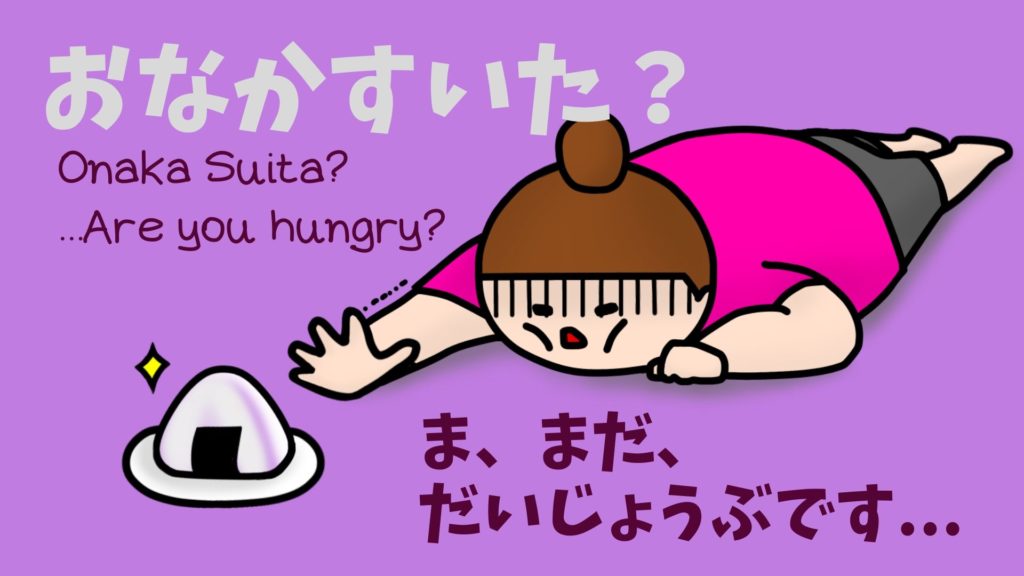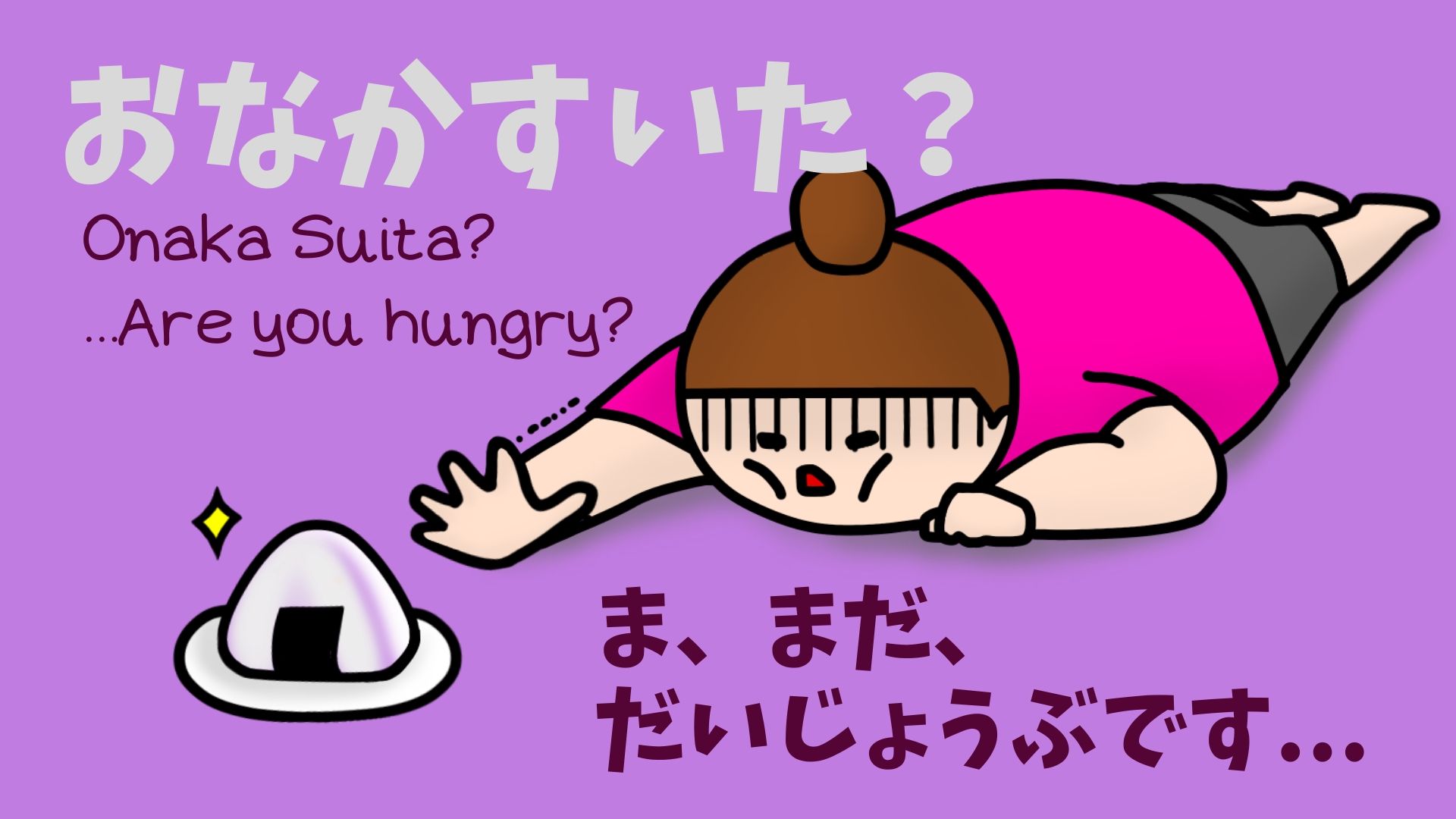There are lots of restaurants and cafes in Japan. When you go out with your Japanese friends, sometimes you may want to ask them “Are you hungry?” How do you say, “I’m hungry” or “Are you hungry?” in Japanese?
There are a few ways to say it, but the easiest phrase will be “おなかすいた(お腹空いた)Onaka Suita”.
In this article, we are going to talk about it in more detail and learn how to use it.
How to say “I’m hungry”

We say “おなかすいた(お腹空いた)Onaka Suita” in Japanese, when you want to say “I’m hungry”.
おなかすいた(お腹空いた)。
Onaka Suita.
I’m hungry.
There are other phrases which mean “I’m hungry”, but this is the most frequently used and the easiest to remember.
You may also hear, “はらがへった(腹が減った)Hara ga hetta”, but this phrase sometimes sounds too casual or even rude.
It is good to be able to understand this phrase when you hear it, but I would recommend you use “おなかすいたOnaka Suita” in any kind of situation.
What does “おなかすいたOnaka Suita” mean?
“おなかOnaka” means “belly” or sometimes “stomach”, and “すいたSuita” means “to have got empty”. So, “おなかすいたOnaka Suita” literally means “(My) stomach has got empty”.
We also say “おなかがすいた(お腹が空いた) Onaka ga Suita” which means the same as “おなかすいたOnaka Suita”.
How to say “Are you hungry?”
When you want to ask someone “Are you hungry?”, you can just say “おなかすいたOnaka Suita?” with an upper intonation.
How to answer is below:
うん、おなか すいた。
Ng, onaka suita.
Yes, I am hungry. (casual)
はい、おなかが すきました。
Hai, onaka ga suki mashita.
Yes, I am hungry. (polite)
おなか すいてない。
Onaka suitenai.
No, I am not hungry. (casual)
いいえ、おなか すいてません。
Iie, onaka suite masen.
No, I am not hungry. (polite)
To soften your negative answer
When someone asks you “おなかすいたOnaka Suita (Are you hungry?)”, they may want to suggest having a meal if you answer “Yes”. In that case, you may want to say something like “I’m not yet hungry, thank you”, instead of answering “No”, if you are not hungry.
You can say;
まだ、だいじょうぶです。
Mada, daijoubu desu.
(I’m) Not (hungry) yet, I’m alright.
“まだ Mada” means “not yet”, and “だいじょうぶ Daijoubu” means “I’m fine”. You can avoid the direct negative answer when you use this phrase.
Various Expressions of “I’m hungry”
“おなかすいたOnaka Suita” is a basic phrase meaning “I’m hungry”. We also have different expressions depending on how hungry we are.
おなか(が)ぺこぺこです。
Onaka (ga) pekopeko desu.
I’m very hungry.
すこし おなか すいた (少しお腹空いた)。
Sukoshi onaka suita.
I am a little hungry.
“すこしSukoshi” means “a little”. It’s almost the same as “ちょっとChotto”, so you can replace “ちょっとChotto” to “すこしSukoshi” in this phrase.
How to say “I am full (I had enough)”
Some Japanese people like to offer food or drink. However, if you are full and don’t want anymore, what can you say?
In Japanese, “I am full” is “おなか(が)いっぱい(です) Onaka (ga) ippai (desu).” We often add “もうMō” which means “already” to express “I’m already full” or “I had enough”.
もう、おなかいっぱい。
Mō, onaka ippai.
I’m already full. (casual)
もう、おなかがいっぱいです。
Mō, onaka ga ippai desu.
I’m already full. (polite)
You can also say “ありがとうArigatou (Thank you)” to show your appreciation for their offers.
“もうMō” and “まだMada”
These are short words, but they are very useful. “まだMada” means “not yet” while “もうMō” means “already”.
We learned “まだ、だいじょうぶですMada, daijoubu desu” meaning “(I’m) Not (hungry) yet, I’m alright”, as an answer to “Are you hungry?”
On the contrary, if you say “もう、だいじょうぶですMō, daijoubu desu” as an answer to “Do you want some more?”, it can mean “I had enough”.
Situation 1. “まだMada”
おなかすいた?
Onaka Suita?
Are you hungry?まだ、だいじょうぶです。
Mada, daijoubu desu.
(I’m) Not (hungry) yet, I’m alright.
Situation 2. “もうMō”
おかわりは?
Okawari wa?
Do you want one more?もう、だいじょうぶです。
Mō, daijoubu desu.
I had enough.
“もう、だいじょうぶですMō, daijoubu desu” is also useful for rejecting drink offers as well as food.
For example, when someone tries to pour some more beer or sake into your glass, you can smile and say “もう、だいじょうぶですMō, daijoubu desu” while covering your glass with your hand. It will be a smart way to reject someone’s offer.






Comments